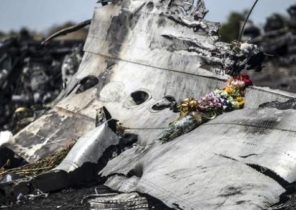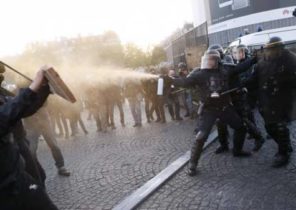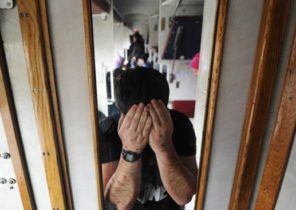It is well known what the weakness of the Russian experienced military parades. For many decades, even under Boris Yeltsin, when the Soviet Union had collapsed and the same fate threatened the Russian Federation, was held the Victory parade, as they are called in Russian. This year the leadership of the Russian Federation was planning a massive parade in honor of the 75th anniversary of Nazi Germany’s defeat in world war II the ninth of may.
But there are insidious and invisible enemy – covid-19, which was not spared the greatest country in the world, and why Moscow suffered a parade on June 24. There is logic in this. On this day exactly 75 years ago in Moscow’s red square held a Grand parade in honor of the grandiose, even reached the astronomical price of victory. It was attended by troops of the army, Navy and the Moscow garrison.
The solemn procession
Units of ten fronts sent him best of the best. Combined shelf comprised of the greatest heroes of the great Patriotic war led by their generals and marshals marched on the ancient red square. The parade was attended by the representative of the commander Georgy Konstantinovich Zhukov, known as the Marshal of the Victory and commanded the parade Konstantin Rokossovsky (Konstanty Rokossowski), a pole by origin. The parade was attended by 24 of the Marshal, 249 2536 generals and officers.
Over marching soldiers waving battle flags under which Soviet soldiers swore allegiance to the Motherland, fought, died, won, and was carrying a heavy defeat. In honor of the parade thundering gun shots, played orchestras. So Moscow honored its armed forces, who are unimaginable number of victims “finished off” in the terminology of the time, “fascist vermin in her lair.”
No symbolism anywhere
It is noteworthy that here, on red square, in the autumn of 1941, the Reich-Chancellor Adolf Hitler was going to hold a ceremonial parade of the victorious troops. The Germans had seen the Soviet capital on the horizon, however, as we know from the parade had to be abandoned, and instead the land before the triumphant German troops inflicted the first significant loss in the Second world war.
During the parade on red square June 24, 1945, two hundred Soviet soldiers under the drums abandoned to the walls of the mausoleum of Lenin, two hundred banners of the German army that the Red army had captured as booty.
A little poetry never hurts
Well-known Russian and Soviet poet and satirist of popular revolutionary pores Demyan Bedny (born Efim Alekseevich Pridvorov), who wrote in the genre of the fable, fairground songs, ditties and epigrams, of course, did not remain indifferent to such a great event and wrote about the victory:
In her last end, and sample — centuries
In it is our honor high approval
In it is a deathly blow to the enemy’s regiments,
In her plan for the enemy’s collapse.
On our portal we wrote about the involvement of the Russian Federation to the efforts and sacrifices of the Soviet Union in the great Patriotic war. However, in the Soviet era, the regime has always stressed the contribution of the entire country, not just the individual republics, and systematically propagated the term “Soviet people”. After the Soviet collapse, the Russian leadership has continued to invite the traditional may day parade of representatives of former Soviet republics gravitated to Russia.
It is clear that the Soviet armed forces have won a victory over such a strong, cunning, powerful enemy, able to improvise literally “to the last”, an incredibly high price, to establish that finally, apparently, will never be possible. For reference I will give Information about the combat losses of the red army in the great Patriotic war, which was prepared by the head of Department of accounting and control of the armed forces Colonel Podolsk in June 1945 (!), when the Soviet soldiers just returned from captivity and when the lives of a great many people remained unknown.
Total combat losses reached 23 635 000 people (!), 5 of which 141 000 killed in battle (according to the reports of troops), 1 190 000 died from wounds in hospitals;13 960 000 were injured, and 2 576 000 were disabled. 2 015 000 were captured and came under consideration in repatriation of bodies 1 196 000 missing (according to the reports of troops), and 133 thousand people identified as unaccounted loss. These losses far exceeded the loss of the Russian armed forces in the First world war
The first of March 1946, the extraordinary state Commission for establishment and investigation of atrocities of Nazi invaders and their collaborators presented the report. According to him, were killed and tortured 6 074 957 civilians, which also must be added 641 803 deaths from starvation during the siege of Leningrad, which increases the total to 6 716 760. Were also killed and tortured 3 912 283 prisoners of war (the latter figure seems exaggerated, since zapadenecj historian and Professor at Heidelberg University Christian Streit wrote in his critical book “we are not comrades” that by the first of February 1945 in a German prisoner of 5 734 528 Soviet prisoners of war killed 3 041 286 people; however, due to the double counting of the number of prisoners of war were overstated, and, moreover, murdered and tortured, as the context referred also died from malnutrition, disease, exhaustion, hypothermia etc.). Now the total number of all Soviet victims of the great Patriotic war, military and civilian, is considered to be 26.6 million citizens.
The uncertainty of the parade this year
While it is not clear in what form there will be a parade this year. Sailors and infantry intensively preparing for the parade, but the mayor of Moscow Sergey Sobyanin in view of the risks associated with a new coronavirus, encouraged citizens to stay home and watch the planned official events on TV. But with confidence we can say that the parade will not be President Milos Zeman. Not surprising — who wants to sit on a two-week quarantine. In strange times we live in.







